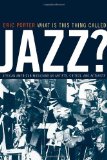What Is This Thing Called Jazz?: African American Musicians as Artists, Critics, and Activists (Music of the African Diaspora)
Despite the plethora of writing about jazz, little attention has been paid to what musicians themselves wrote and said about their practice. An implicit division of labor has emerged where, for the most part, black artists invent and play music while white writers provide the commentary. Eric Porter overturns this tendency in his creative intellectual history of African American musicians. He foregrounds the often-ignored ideas of these artists, analyzing them in the context of meanings circulat
List Price: $ 34.95
Price: [wpramaprice asin=”0520232968″]
[wpramareviews asin=”0520232968″]



Required Reading for Anyone Interested in Jazz Criticism,
Eric Porter’s excellent academic work delves deeply into the current debates on jazz, as well as provides a thorough overview of how musicians have defined their art in their own terms throughout the history of jazz. As with the history of any art (e.g., painting, photography, literature), it becomes apparent that what we get in jazz criticism is a series of narratives that occasionally correspond to one another but often tend to diverge markedly at various points. Porter’s book is extremely valuable because it focuses on the voices that have not been adequately represented in the discourse on jazz-the voices of the musicians themselves.
What I particularly enjoy about Porter’s book is its even-handed tone. The book is exhaustively researched and follows a logical progression from the rise of jazz in the early twentieth-century to modern times. His discussions of the essays of Duke Ellington, WC Handy, and prominent intellectuals (Zora Neale Hurston, WEB Dubois, Alain Locke et al.) are all placed in the context of a larger discussion of race, gender, economics, and American culture. At the same time, Porter’s role is clearly that of a researcher and scholar; he is not someone who passes judgment on the thoughts of the musicians. He simply presents us with the information.
In addition to analyzing thoroughly the roots of jazz, there are lengthy and informative chapters on the development of bebop, the music and thought of Charles Mingus, and that of 60s stalwarts such as Leo Smith and Anthony Braxton. The discussion of Braxton’s massive tomes (the Tri-axium Writings) is particularly welcome, since his universalist approach to music has put him in an unusual position with the regard to the jazz community, arguably since his contract with Arista expired over two decades ago. The discussion of the neo-conservative movement in jazz, led by Wynton Marsalis and Stanley Crouch, appropriately follows the discussion of Braxton’s work and illustrates the challenges that jazz critics face as the music increasingly draws upon a myriad of musical forms that draw attention to the inadequacies of conventional criticism. What I particularly enjoyed was Porter’s lucid discussion of the similarities as well as the differences in the thought of Braxton and Marsalis. Porter’s organized presentation of such topics certainly enabled me to appreciate the thoughts of all the jazz musicians discussed in the book, whether I agreed with them or not.
The value of this book is that it not only shows the reader the viewpoints of the often neglected musicians, but also does not shy away from the critical, theoretical, and cultural complexities with which critics and musicians must deal in the future of jazz music. It is a valuable step indeed to understanding, if not definitively answering, “What is this thing called jazz?”
0
Was this review helpful to you?

|